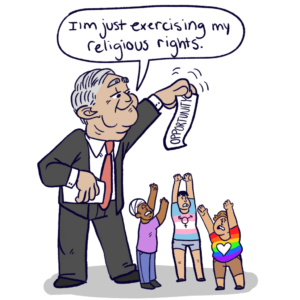The staff editorial is the majority opinion of The Murray State News Editorial Board

College students are eerily adept at making things up as they go; the phrase “fake it ‘til you make it” comes to mind. And while it’s all fine and good for a student, we expect a bit more out of our nation’s leader. Unfortunately, our expectations continue to be dashed.
Attorney General Jeff Sessions exacerbated this issue with his proclamation to “defend religious freedom” in a memo to federal agencies, fueling the debate over discrimination.
The vagueness of the memo may be the most concerning issue and has many civil rights groups calling foul.
The 25-page document lists 20 guidelines which government agencies must now follow in order to ensure religious liberties are not infringed upon.
We can agree that freedom of religion is an important part of our everyday lives; it ensures every citizen may worship (or not) as they see fit. The diversity of worship centers across the nation is a testament to the amendment’s effectiveness.
However, Sessions has given largely free reign to federal employees of faith, leading to confusion over who may refuse to do their job, when, and to what degree. The guidelines do protect individuals based on race and sex, but the LGBT community has earned the right to be concerned.
According to the memo, sex discrimination “does not encompass discrimination based on gender identity, per se, including transgender status.”
The guidelines largely avoid naming certain groups and whose rights may be infringed upon on account of one’s religion; considering the current administration’s animosity towards acceptance and change, it comes as no surprise transgendered individuals have been singled out as an example.
Religious liberty is already protected under the constitution. Worship centers aren’t being shuttered. The government isn’t censoring individuals due to their faith.
So what was the purpose of the memo?
Much like most of the administration’s actions, it’s likely an attempt to appeal to the voter base which put them into power. And with approval ratings steadily falling, it’s not hard to see why.
The vagueness of the guideline’s limitations is as important as what is addressed, and though the memo doesn’t have the power to codify these guidelines into law, it does leave one big question: who should get to decide when, and under what pretenses, they do their job?
Freedom to worship and share your beliefs is a cornerstone of our constitution and a right which should not be infringed upon. But where will the line between religious liberty and discrimination be drawn? We haven’t received a tweet with that answer just yet.